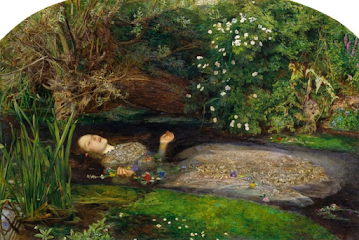Addison: [Pleasures of the Imagination]
The Spectator, No. 411, Saturday, June 21, 1712
(I travel unpathed haunts of the Pierides [muses],
Trodden by step of none before. I joy
To come on undefiled fountains there,
To drain them deep.
Lucretius, De rerum natura, I. 926-28)
Trodden by step of none before. I joy
To come on undefiled fountains there,
To drain them deep.
Lucretius, De rerum natura, I. 926-28)
In 1712, the Enlightenment period was centered around marriage, family, and courtesies people to extend towards others in society. Keeping their articles in line with the philosophy of that time, Joseph Addison and his friend, Richard Steele wrote a daily publication, The Spectator.
These articles were aimed towards the middle-class household, and especially aimed toward the women who were "seeking to improve their refinement and taste." Addison and Steele encouraged their readers to become more informed and helped enable them to participate in "well-reasoned discussion, and equip them to carry on the conversations and engage in social interactions in a polite manner."
Addison wrote Pleasures of the Imagination in an effort to inspire their readers to take in as much aesthetic beauty as they could, for it is through the eye that all imagination is birthed. It is from our memories and understanding that vision is strengthened. Knowledge builds upon experience and from the mind can be improved upon. For instance, we can remember walking through the woods as a child, and while dreaming of that, our mind can envision a magical forest full of fantastical creatures and wonderous trees reaching the heavens.
He also gives an encouraging nudge of hope to his readers by eluding to the fact that imagination is transportation from the boring to the extraordinary - "yet it must be confessed that those of the imagination are as great and as transporting as the other. A beautiful prospect delights the soul as much as a demonstration;"
He also adds that there are health benefits while engaging in the acts of imagination when he writes "the pleasures of the fancy are more conducive to health than those of the understanding," and goes on to write, "Delightful scenes, whether in nature, painting, or poetry, have a kindly influence on the body as well as the mind, and not only serve to clear and brighten the imagination but are able to disperse grief and melancholy, and to set the animal spirits in pleasing and agreeable motions."
He also adds that there are health benefits while engaging in the acts of imagination when he writes "the pleasures of the fancy are more conducive to health than those of the understanding," and goes on to write, "Delightful scenes, whether in nature, painting, or poetry, have a kindly influence on the body as well as the mind, and not only serve to clear and brighten the imagination but are able to disperse grief and melancholy, and to set the animal spirits in pleasing and agreeable motions."
Addison dares to challenge the uneducated to become more than "vulgar" by filling their minds with poetry, appreciating a painting, and taking leisure time in a meadow rather than collecting meaningless items that clutter the home. Finding satisfaction in "innocent pleasures" should not be looked down upon by anyone. On the contrary, those pleasures are more easily discovered in nature than in mundane labor.
Addison wrote that this "Makes the most rude, uncultivated parts of nature administer to his pleasure; so that he looks upon the world, as it were, in another light, and discovers in it a multitude of charms that conceal themselves from the generality of mankind." (The middle-class could also be called the working-class. So this probably challenged their way of thinking just a bit.)
In the end, his last attempt at convincing them that what he says is true, he highlights Sir Francis Bacon's Essay upon Health by explaining that he too implores the readers "to pursue studies that fill the mind with splendid and illustrious objects, as histories, fables, and contemplations of nature."
Webpages visted:
https://philosophy.lander.edu/intro/articles/addisonart-a.pdf
https://en.wikipedia.org/wiki/The_Spectator_(1711)





Comments
Post a Comment